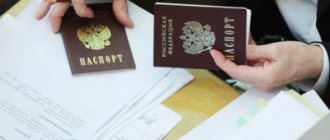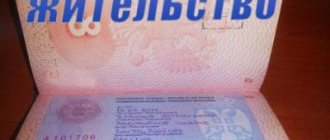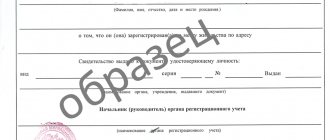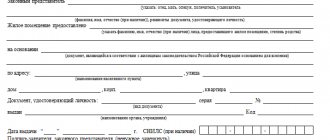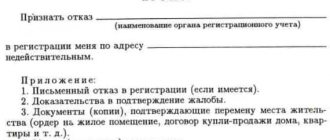At the state level, two types of control over the movement of citizens on the territory of the Russian Federation are legislatively established - registration at the place of stay and registration at the place of residence. The first is temporary, the second is permanent. At the same time, the issue of registration often becomes problematic not only for foreigners, but also for Russians who do not have their own residential property. Problems with law enforcement agencies and full social coexistence without registration will certainly arise, since by law it is mandatory for everyone.
In fact, registration is a permit for a person to live in any premises. In addition, the population’s rights to housing are secured by law. Despite this, there are situations when registration is impossible even with the consent of the owner of the living space.
This usually happens in situations with municipal apartments, in which rules regarding the established norms of area per person are observed.
Registration is also due to the need for government agencies to ensure security in the country. With the free movement of the population without registering, it is extremely difficult to track violators and persons who have committed criminal acts.
General information
Only the owner of residential property has the right to register additional residents in an apartment, regardless of whether it is personal or municipal property. If several people have the right to an apartment at once, then registration is possible only with written consent from each owner. From the legal side, registration without the consent of the owner and other owners is quite possible if you need to register:
Dear readers!
Our articles talk about typical ways to resolve legal issues, but each case is unique. If you want to find out how to solve your specific problem, please contact the online consultant form on the right →
It's fast and free!
Or call us by phone (24/7):
If you want to find out how to solve your particular problem, call us by phone. It's fast and free!
+7 Moscow,
Moscow region
+7 Saint Petersburg,
Leningrad region
+7 Regions
(free call for all regions of Russia)
- A minor child (provided that at least one of his parents is registered in the same apartment);
- Close relative (spouse, parent, adult children). Only a written request from the owner who owns the property is required;
- A co-owner who has a share in the apartment.
Documents for registration:
- Written statement from the owner in the prescribed form;
- Passports of all participants in the procedure (real estate owner, registered person and co-owners);
- Title documents for housing or social tenancy agreement;
- Arrival sheet;
- Written consent of the co-owners of residential property, as well as all citizens registered in the apartment (if it is municipal property);
- House book for the owner of a private house.
If a citizen does not live at the place of registration?
The legal possibilities of the owner registered, but not living in the apartment, are preserved in relation to the rights of its other owners in the share designation in the title documents. Such a person directly influences all procedures of a housing transaction , and has the full right to use it.
A registered but non-resident third party also has the right to use the housing facility. However, if the owner intends to evict him, long-term non-residence can become a decisive factor: evidence of staying for a long time in another place can convince the court to make a decision to evict such a tenant.
As we see, different statuses of subjects of civil relations regulate the individual rights and obligations of these parties in housing issues. Any claims to housing by residents who do not own it are unlawful. At the same time, when making various types of transactions, its owner should take care to comply with all discharge procedures in order to avoid “surprises” for new owners in the future.
If you find an error, please select a piece of text and press Ctrl+Enter.
What does a person get?
Owners and registered citizens often wonder what rights registration in a residential apartment gives. Answering this question, it should be noted that registration gives the rights to:
- Live indoors;
- Use the common property in the apartment, as well as common house property;
- Get an insurance number for an individual personal account and a tax identification number;
- Register individual entrepreneurship;
- Receive benefits and subsidies;
- Place children in kindergarten or school;
- Get a job officially. Despite the fact that, by law, lack of registration cannot serve as a reason for refusal, in practice it happens differently;
- Register your own young children in the apartment without the consent of the owner;
- Make decisions regarding the registration of other residents (if this is municipal housing).
In fact, these rights are only of a notification nature and have nothing to do with encroachment on real estate. Registration only affects the priority right when buying a home if the owner wants to sell it. This also applies to partially privatized living space.
How to register
To obtain permanent or temporary registration, you will need to prepare the following documents:
- statement;
- passport or birth certificate of the child, if registration is issued for him;
- the document on the basis of which registration is made: a certificate of housing ownership (when a person registers in his personal apartment), written permission from the owner or a social rent agreement when registering in municipal housing;
- written consent of the owner of the premises and other homeowners;
- act on the establishment of a trustee or guardian (if this document is available).
If a person registers permanently, then he or she will not need to provide a document confirming deregistration at the previous place of residence. As soon as the applicant registers at a new address, the previous registration will be canceled automatically.
There are several ways to register.
- The fastest and easiest way is through the government services portal, which requires a verified account. After logging in to the site, you will need to find the required service and fill out an electronic application. Then the user will receive a notification within 3 working days, which will contain information about the date of the visit to the Main Migration Department of the Ministry of Internal Affairs. You will need to provide the institution employee with the necessary documents to verify them with the information specified in the electronic application. Registration will be completed on the same day.
- You can also contact the MFC or management company. In this case, the period for providing the service will increase, since it will take time to transfer documents to the registration authority. The officer will take the documents provided by the applicant and give him a receipt in return. It will contain the approximate date of service availability.
- Finally, you can visit the Main Migration Department of the Ministry of Internal Affairs and provide the employee with all the necessary documents. A representative of the authorities will receive them and inform the applicant when he needs to visit the institution again. The service delivery period ranges from 3 to 8 working days. Disadvantages: there is a queue and the institution’s operating hours are not always convenient.
Features and Differences
Registration in a house does not give registered citizens ownership of the property.
However, if the residential space is owned by the state, then all registered residents can become its co-owners, provided that they have not previously been participants in privatization. This procedure provides such rights on a general basis in accordance with the latest edition of Russian legislation, whatever the circumstances. All residents, including minor children, become participants in privatization. At the same time, they do not lose the opportunity to independently become participants in privatization after coming of age. Since privatization may become a burden in the future, it is necessary to make extremely thoughtful decisions regarding the registration of new residents in the apartment, even if they are relatives.
Registration gives the same rights to both the registered person and the owner of the living space, with the difference that only the owner of the property can dispose of it, enter into transactions and bears full responsibility for the safety of the housing and possible debt. On the other hand, for the owner, registering new residents, even if they are very close people, is always associated with many risks.
Registration in an apartment: general information
The institution of registration has been liquidated in the Russian Federation since 1993, since then it has been replaced by mandatory registration. When moving to new permanent or temporary housing, citizens are required to register:
- at the place of residence - permanent registration - which recognizes the address of a citizen’s permanent or primary residence in which he intends to reside indefinitely;
- at the place of stay - temporary registration - which recognizes a person’s temporary housing, where he intends to live for a limited period of time, the duration of which is agreed in advance with the owner of the living space.
Permanent registration is required for everyone who moves to a new permanent residence address within the first 7 days of the move. Temporary registration is issued only in cases where a citizen intends to live at a temporary address for more than 3 months, and the place of his temporary housing is located outside the subject of the federation where permanent registration has been issued.
Note!
A citizen living without registration and the owner of the premises who allowed such residence may be brought to administrative liability under Art. 19.15.1 Code of Administrative Offences. The fine is 2-3 thousand for citizens and 2-5 thousand rubles for owners. Close relatives and family members of the owner are exempt from liability under this article.
Owner's rights
Property is divided into two types: privatized (private) and municipal (social).
Municipal real estate cannot be the object of transactions, so fraudulent transactions with it are reduced to almost zero. The owner who has rights to the apartment can solely dispose of it. Registration does not give the tenant such a right. He can only reside and use common property. As an exception, it can be noted that registration gives the tenant the right to independently register his young child in the house, which can create serious difficulties for the owner. The owner who has rights to the apartment cannot forcibly evict a child without a court decision, whatever the grounds for this. In addition, even the right of ownership does not allow him to get rid of unwanted tenants if a person and a child have nowhere to move out, that is, there is nowhere to register or the housing conditions do not meet the requirements of sanitary and technical standards. In addition, guardianship authorities are involved in resolving such issues. Therefore, it is necessary to seek help from a qualified, experienced specialist.
Privatized and municipal housing
In situations in which a person lives in an apartment, having property rights obtained under a privatization agreement signed with the owner of the property, he must fulfill all obligations and observe the rights specified in the text of this document. It is worth noting that a person loses the right to a share in such housing, even if he is registered in it, in the event of dissolution of family relationships with the person who owns the property. This rule does not apply only on the condition that other documents with different conditions have not been drawn up earlier. In practice, it is easy to see that even the court has the opportunity to assign to a citizen his right only for a limited period of time.
The legislation especially closely monitors families and the fulfillment of their obligations when concluding a social rental agreement, with the possibility of further privatization of the apartment. The state defines the family of the actual employer, his spouse, children, and parents. Other individuals who have family ties with the employer are recognized as relatives only if they live together and run a household. It is possible to individually privatize a share of an apartment only if family ties with the tenant have been terminated.
Social property
In a situation with private property, the law gives more rights to the owner than to the citizen registered in the apartment.
Registration does not affect the owner’s decisions regarding the implementation of any transactions with his real estate, that is, he can sell, donate or exchange it at any time. Registration does not give the tenant any right to dispose of the living space given to him exclusively for living. Things are somewhat different if the housing is social and owned by municipal authorities. Here the state acts as the owner, and registration gives all residents equal rights and opportunities. Whether to take part in privatization, if this becomes an issue, everyone decides individually, since according to the law, not the entire apartment can be privatized, but only part of it. At the same time, if full privatization is refused, registration gives the person who refused the right to use housing and live in it, as before, despite the fact that he will not have property rights. This often affects the conclusion of a transaction when the owners want to sell a privatized apartment. In this case, she will be considered encumbered.
The rights and responsibilities of a person who is registered in housing - with the owner or with the municipal
When the owner registers a person with him, he gives him the right of use (residence) and confirms this with his written consent at the passport office/MFC. Clause 2 Art. 30 of the Housing Code of the Russian Federation - “The owner of a residential premises has the right to provide possession and (or) use of residential premises belonging to him by right of ownership to a citizen on the basis of a rental agreement, a contract of gratuitous use or on other legal grounds.” Clause 49.4 of Order of the Ministry of Internal Affairs N 984 - “Simultaneously with the application for registration at the place of residence, the applicant submits: written consent for the citizen to move into the residential premises from adult users living together with the tenant of the residential premises, the landlord, and all participants in shared ownership (if necessary).”
According to the law, a registered person can use housing, because his right is recorded with a stamp in his passport and the consent of the owner. Only in practice there is a rather subtle point with the right of use.
On the one hand, if the owner does not want to let a registered person into his home, by law he must first document the deprivation of that right of residence. And for this you will have to go to court - clause 1 of Art. 35 Housing Code of the Russian Federation. There is no other way. The owner should file a claim to recognize the registered person as having lost the right to use, obtain a court decision and submit it to the passport office - Art. 7 of the Law of June 25, 1993 N 5242-1. Only after this will the citizen be discharged.
On the other hand, if the owner does not let in what is prescribed, there is no liability for this - neither administrative nor criminal. Of course, there is an article on granting fictitious registration, but it is applied only when it is qualified as a socially dangerous act - clause 18 of the Supreme Court Resolution No. 18 dated 07/09/2020. In practice, no judge will take into account this article on fictitious registration.
A registered citizen who is not allowed into the home may file a claim in court for entry and non-obstruction of residence - clause 2 of Art. 31 Housing Code of the Russian Federation. There is no point in contacting the police. Move-in is carried out only by bailiffs with the corresponding court decision in hand - paragraphs. 8 tbsp. 68 and art. 108 of the Federal Law on Enforcement Proceedings. In turn, the owner can file a counterclaim against him for loss of the right of residence. This is usually what the owners do - they don’t let them in, and then they file a claim (in advance or counter-claim). The main thing in this situation is that most often the court sides with the owner, because he has more legal grounds to win the case. Read this article very carefully - how an owner can remove a person from his apartment.
As you can see, in the situation with the right of use, not everything is so simple. And the owner does not have the right not to let you in without a court decision, and the registered person does not have the right to move in without a court decision if the owner does not agree. The actions of each of the parties can be perceived as arbitrariness - one does not let in, and the other is trying to move in.
I hope the right of use is clear. The owner should also remember the following: when receiving a loan, you must indicate your residential address. This may affect him if the person registered when receiving the loan indicates his home and subsequently stops paying. Most likely, collectors will visit the address, thereby causing inconvenience to all residents. Unfortunately, there's nothing you can do about it. The owner needs to take this into account when registering a person.
Individual entrepreneur as an employer
First of all, the Labor Code specifies what the responsibilities of an individual entrepreneur as an employer are. But labor legislation is not limited to this document. A citizen who has registered the status of an individual entrepreneur has the right to hire workers or not to hire, enter into contracts, develop job descriptions, other internal documents, demand their compliance, etc. At the same time, for the labor services provided, he is obliged to:
- pay the agreed wages;
- provide a workplace and working conditions;
- pay insurance premiums;
- maintain personnel records and reporting for employees;
- follow labor protection and fire safety rules, conduct instructions, etc.
The list is not exhaustive; only basic obligations are given.


